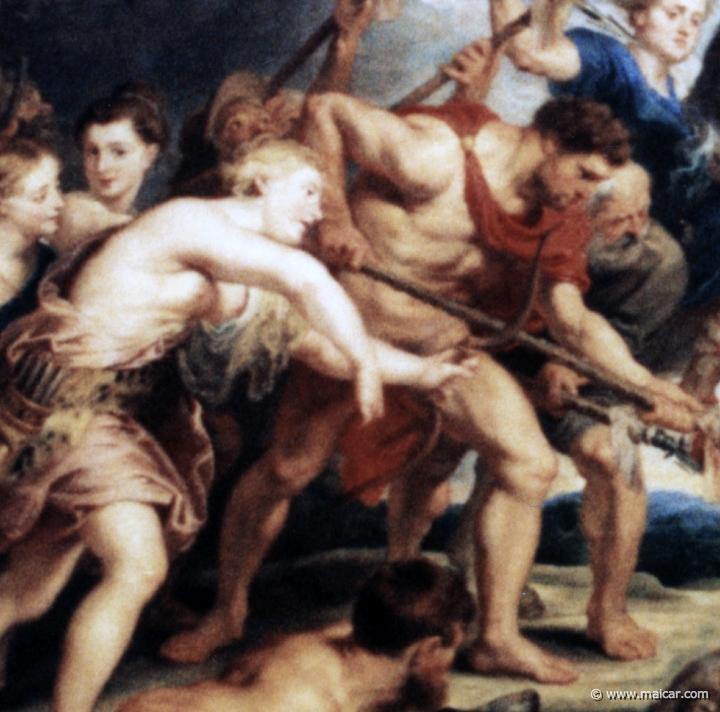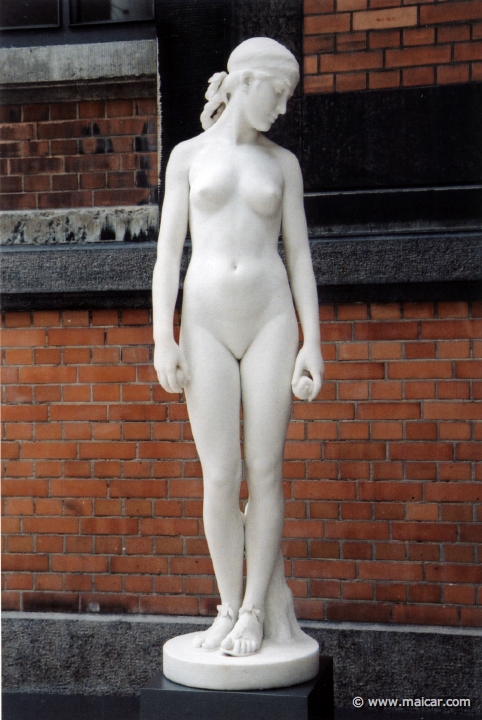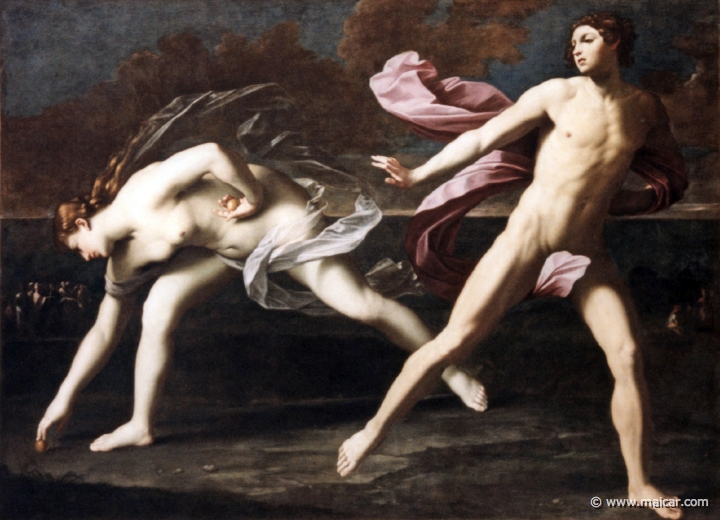Atalanta
Ἀταλάντη |
|
|

|
Atalanta and Meleager hunting the Calydonian Boar. 0534: Painting by P. P. Rubens 1577-1640 (detail). Künsthistorische Museum, Wien.
|
|
|
|
|

|
Atalanta holding the golden apples of Aphrodite. 9412: Vilhelm Bissen 1836-1913: Atalanta, 1891. Marble. Statens Museum for Kunst, Copenhagen.
|
|
|
"A husband will be your
bane, O Atalanta; flee from the intercourse of
husband; and yet you will not flee, and, though
living, you will lose yourself." (The Oracle to Atalanta. Ovid, Metamorphoses 10.565).
|
|
Atalanta could defeat a man in wrestling, and surpassed the most swit-footed men in the contest of race, and whether Atalanta's fleetness or her beauty was more worthy of praise, it was difficult to say. Atalanta sailed with the ARGONAUTS, and later
killed the Calydonian Boar. She also slew many of
her suitors, but enchanted by the Golden Apples of
Aphrodite, she became
first a wife, and then a lioness.
Atalanta exposed
Atalanta's father, whoever he was, for there is no agreement about that matter, desired a son, and being disappointed when Atalanta was born, he exposed her to die somewhere in Arcadia. But she survived, for a she-bear appeared and gave her suck until some hunters, having found her, brought her up. When Atalanta grew up, she became a beautiful woman, but kept herself a virgin. She was very swift and used to surpass men in the race, and once she won a wrestling match against Peleus, who later became Achilles' father, during the games that were held in honour of King Pelias 1. Living and hunting in the wilderness, she remained always under arms, ready to defend herself, and, for example, when the CENTAURS Rhoecus and Hylaeus 1 tried to rape her, she shot them down and killed them both.
Negligence of Oeneus 2
Now, it happened that King Oeneus 2 of Calydon, while sacrificing the first fruits of the annual crops of the country to all the gods, forgot Artemis. This negligence upset the goddess, who sent a boar of huge size and strength which prevented the land from being sown, and destroyed both cattle and people. In order to get rid of this ravaging beast, King Oeneus 2 assembled the noblest men of Hellas, who are now remembered as the CALYDONIAN HUNTERS, and promised to give the boar's skin as a prize to him who should kill it.
Hunting with a woman
Among these noble men came also Atalanta, who shortly before had sailed with the ARGONAUTS. However, there were those, like the Arcadians King Cepheus 2 of Tegea and Ancaeus 1, who disdained going hunting with a woman, but Oeneus 2's son Meleager, being in love with Atalanta (though he himself was already married to Cleopatra 4), compelled them to follow the chase with her. During the hunt, either because of fortune or ability or both, Atalanta was the first to shoot the boar with an arrow, and second Amphiaraus shot it in the eye, and finally Meleager came and killed it by a stab in the flank.
Prize disputed
When Meleager received the skin as a prize, he, being in love with Atalanta, gave it to the huntress. However, other hunters—the sons of Thestius 1—disliked a woman getting the prize in the face of men, and so they took the skin from her, arguing that it belonged to them by right of birth, if Meleager did not want it (for they were the brothers of Meleager's mother, that is, his uncles). Meleager then, losing his temper, slew them and gave the skin back to Atalanta, but Meleager's mother Althaea did not forgive him his having killed her brothers, and secured her own son's death. Others have said, however, that the boar's skin caused a civil war between the Curetes—represented by the sons of Thestius 1—and the Calydonians, represented by Meleager, and that the latter slew his mother's brothers in battle, himself perishing in the same war.
Conditions to marry her
When after these events Atalanta reunited with her father, she asked that she might remain a virgin. But as many sought her in marriage, her father set up a contest with the following rules: Each of Atalanta's suitors should contend with her in a race so that the man should flee unarmed, and she should pursue him with a weapon; if she overtook him within the limits of the race, she should kill him and fix his head up in the stadium, but if he was not caught up, his due was marriage.
|

|
Atalanta delayed by the apples. 7429: Guido Reni 1575-1642: Atalanta e Ippomene. Capodimonte Palace and National Gallery, Naples.
|
|
Atalanta defeated
Many perished in this cruel race, the conditions of which she herself announced:
"I am not to be won till I be conquered first in speed. Wife and couch shall be given as prize unto the swift, but death shall be the reward of those who lag behind." (Atalanta to the suitors. Ovid, Metamorphoses 10.570).
But when Melanion—or, as others say, Hippomenes 2—was being pursued, he threw down the golden apples that he had received from Aphrodite, and Atalanta, picking up the dropped fruit, was beaten in the race.
Atalanta changes shape
On taking home his new wife, the fortunate suitor, forgetting that he had won by Aphrodite's favor, did not give thanks to the goddess. So while he was sacrificing on Mount Parnassus to Zeus to celebrate his victory, he was, through Aphrodite's anger, inflamed with desire and lay with Atalanta in the temple while the sacred images turned away their eyes. And because of this profanation, Zeus turned them into lion and lioness. Yet others have said that his happened later, when once Atalanta and her husband (Melanion or Hippomenes 2) were hunting. They are said to have entered into the precinct of Zeus, and having made love in the temple, were changed into lions.
|
| Family |
Parentage (three versions)
|
|
|
|
|
|
|
|
|
|
Schoeneus 1 is an Arcadian.
- Iasus 1 from Arcadia is the son of Lycurgus 2, son of Aleus, son of Aphidas 1, son of Arcas 1, son of Zeus and
Callisto.
- Clymene 3 is the daughter of Minyas, the man who owned a marvellous treasure in Orchomenus, and Euryanassa 1.
- Maenalus 2 is otherwise unknown.
|
|
|

Parthenopaeus
|
Melanion is son of Amphidamas 1, son of Lycurgus 2 (see parentage above). Melanion's sister Antimache married King Eurystheus, the man who ordered Heracles 1 to perform his LABOURS. Some say that Tlesimenes (see below) was son of Melanion, and not of Parthenopaeus.
Some have said that Parthenopaeus was exposed by his mother, who pretended to be still a virgin, on Mount Parthenius in Arcadia.
Parthenopaeus, is one of the SEVEN AGAINST THEBES. He died in that first Theban war, killed by Amphidicus, son of Astacus. Others say that Parthenopaeus was killed by Periclymenus 3, son of Poseidon and Astypalea. Still others assert that he was killed by Dryas 9, a chieftain from Tanagra (a city east of Thebes), who came to defend Thebes from the SEVEN with a thousand archers. Parthenopaeus married Clymene 2 and had children by her: Tlesimenes, Promachus 1 and Biantes 1. Among these, the best known are Promachus 1 and Tlesimenes, who are counted among the EPIGONI.
|
|
|
Meleager was son either of Oeneus 2 and Althaea, or of Ares and Althaea. When he was seven days old, the MOERAE declared that he should die when the brand burning on the hearth was burnt out. On hearing that, his mother snatched up the brand and deposited it in a chest. But later, from grief at the slaughter of her brothers, she kindled the brand. However, Meleager is sometimes said to have been killed in battle. Meleager was married to Cleopatra 4, daughter of Idas 2, who was killed by Polydeuces (one of the DIOSCURI). Meleager and Cleopatra 4 had a daughter Polydora 3, who was married to Protesilaus, the first of the Achaeans to be killed in the Trojan War.
|
|
|
|

d) Hippomenes 2
|
Hippomenes 2 was son of Megareus 2 and Merope 6. Megareus 2 is said to have come from from Onchestus with an army of Boeotians to help King Nisus 1 of Megara in his war against King Minos 2 of Crete.
|
|
|
|
|
|
| Related sections |
|
|
|
Sources
Abbreviations |
Apd.1.8.2, 3.9.2, 1.9.16; Cal.Ar.215; Dio.4.34.4; Hes.CWE.14; Hyg.Fab.71; Soph.OC.1320; Prop.1.1.15; Stat.Theb.4.309; Pau.8.35.10.
|
|
|